6.1
6.1
6. Mit csinál a tanár a teremben?
Verbs and verb conjugation in 1st / 2nd / 3rd person singular
Pages 25-27 in the printed book
Verb categories
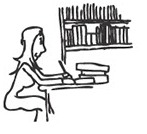 |
tanul+ok |
|
Anna vagyok. Diák vagyok.
A könyvtárban tanulok. (I’m Anna. I’m studying in the library.) |
|
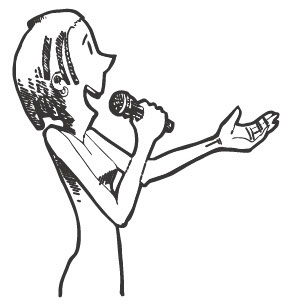 |
énekel+ek |
|
Elvira vagyok. Énekes vagyok.
Mindig énekelek.(I’m Elvira. I’m a singer. I’m always singing.) |
|
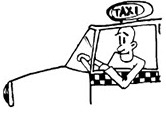 |
ül+ök |
|
Róbert vagyok. Taxisofőr vagyok.
Az autóban ülök. (I’m Róbert. I’m a taxi driver. I’m sitting in the car.) |
|
| category |
Back vowel verbs |
Front vowel verbs |
Rounded vowel verbs |
| base form (as in dictionaries) | tanul | él | ül |
| first person singular (én) form | tanulok | élek | ülök |
This chart focuses on the 1st person singular form of verbs. Verbs can be grouped into three basic categories based on the vowels they contain. The verb endings must phonologically fit the vowels in the verb – this is known as vowel harmony. This basic rule also determines noun endings.
If a verb is conjugated in the present tense, the 1st person ending has three variations: -ok/-ek/-ök. The vowels in the base form of the verb determine which ending to take:
Front vowel verbs contain only front vowels (e, é, i, í) and take the front vowel ending -ek when conjugated.
Back vowel verbs contain only back vowels (a, á, o, ó, u, ú) or both back vowels and front vowels and take the back vowel ending -ok when conjugated.
Rounded vowel verbs contain only rounded vowels (ö, ő, ü, ű) and take the verb ending with a rounded vowel -ök when conjugated.
Please note that rounded vowels are actually a sub-category of front vowels. They are called rounded because they are pronounced with rounded lips.
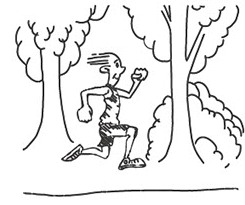 |
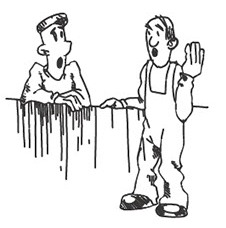 |
| A fiú a parkban fut. (The boy is running in the park.) |
A két szomszéd beszélget. (The two neighbours are chatting.) |
Note: although két szomszéd means two neighbours Hungarian doesn’t use a plural form. This is a general rule: if a noun stands with any type of quantifier the noun is not pluralized and the verb it stands with is not in plural either.
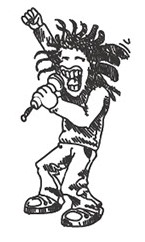 |
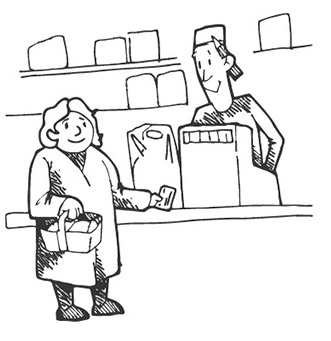 |
| A fiú énekel. (The boy is singing.) |
A nő a boltban vásárol. (The woman is shopping in the shop.) |
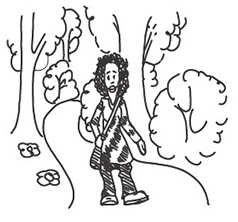 |
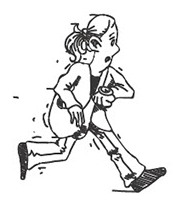 |
| A lány a parkban sétál. (The girl is strolling in the park.) |
A lány siet. (The girl is in a hurry.) |
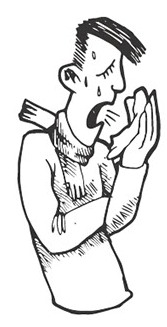 |
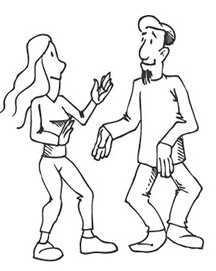 |
| A férfi köhög. (The man is caughing.) |
A férfi és a nő táncol. (The man and the woman are dancing.) |
Note: when people (several singualr objects) are listed both singular and plural forms can be used.
 |
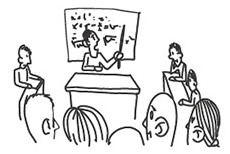 |
| A diák tanul. (The student is studying.) |
A tanár a teremben beszél. (The teacher is talking in the classroom.) |
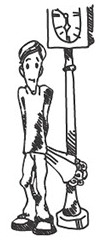 |
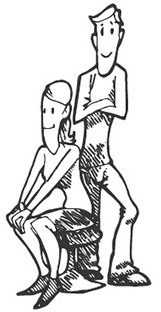 |
| A fiú vár. (The boy is waiting.) |
A fiú áll, a lány ül. (The boy is standing, the girl is sitting.) |
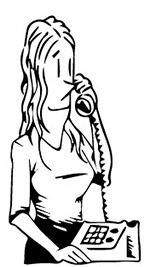 |
A lány telefonál. |
6.2
6.2
Ki vagy? Hol vagy? Mit csinálsz? (Who are you? Where are you? What are you doing?)
Page 27 in the printed book
Four people introduce themselves in a couple of sentences. They use first person singular forms (én). Then everything appears in second and third person singular (te and ő).
 |
Anna vagyok. Német diák vagyok. Berlinben élek. 28 éves vagyok. Most a könyvtárban tanulok. Te Anna vagy. Német diák vagy. Berlinben élsz. 28 éves vagy. Most a könyvtárban tanulsz. Ő Anna. Ő német diák. Berlinben él. 28 éves. Most a könyvtárban tanul. |
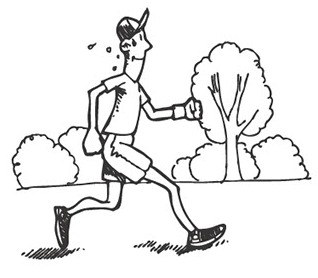 |
Róbert vagyok. Magyar üzletember vagyok. Londonban élek. 35 éves vagyok. Most a parkban futok. Te Róbert vagy. Magyar üzletember vagy. Londonban élsz. 35 éves vagy. Most a parkban futsz. Ő Róbert. Ő egy magyar üzletember. Londonban él. 35 éves. Most a parkban fut. |
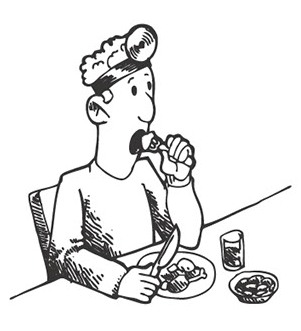 |
Vesa vagyok. Finn orvos vagyok. Helsinkiben élek. 38 éves vagyok. Most az étteremben ülök és ebédelek. Te Vesa vagy. Finn orvos vagy. Helsinkiben élsz. 38 éves vagy. Most az étteremben ülsz és ebédelsz. Ő Vesa. Ő egy finn orvos. Helsinkiben él. Ő 38 éves. Most az étteremben ül és ebédel. |
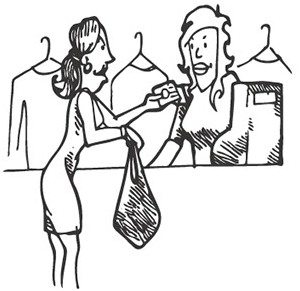 |
Bogna vagyok. Lengyel tanár vagyok. Varsóban élek. 51 éves vagyok. Most a boltban vásárolok. Te Bogna vagy. Lengyel tanár vagy. Varsóban élsz. 51 éves vagy. Most a boltban vásárolsz. Ő Bogna. Ő lengyel tanár. Varsóban él. 51 éves. Most a boltban vásárol. |